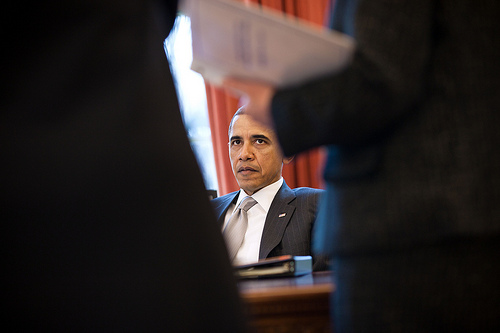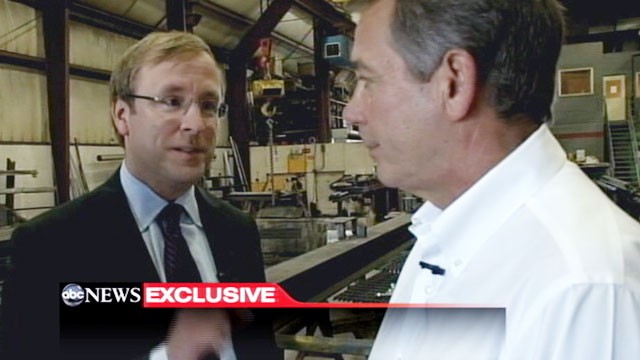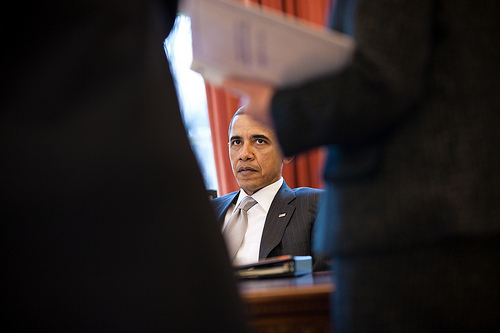 Klein writes, “as Democrats moved to the right to pick up Republican votes, Republicans moved to the right to oppose Democratic proposals.”Photo: The White HouseThe Washington Post‘s Ezra Klein has a terrific column that places the failed climate bill into the political context that has been missing from so much of the recent debate:
Klein writes, “as Democrats moved to the right to pick up Republican votes, Republicans moved to the right to oppose Democratic proposals.”Photo: The White HouseThe Washington Post‘s Ezra Klein has a terrific column that places the failed climate bill into the political context that has been missing from so much of the recent debate:
If you put aside the emergency measures required by the financial crisis, three major policy ideas have dominated American politics in recent years: a plan that uses an individual mandate and tax subsidies to achieve near-universal health care; a cap-and-trade plan that attempts to raise the prices of environmental pollutants to better account for their costs; and bringing tax rates up from their Bush-era lows as part of a bid to reduce the deficit. In each case, the position that Obama and the Democrats have staked out is the very position that moderate Republicans have staked out before.
In the climate bill debate of the past two years, Obama and the Democrats embraced Republican ideas in an effort to minimize or avoid the partisanship inherent in other approaches that had been explicitly rejected by Republicans, including a tax and a massive ramp up in clean energy funding, as I’ve argued.
But Klein makes an effective case that it simply didn’t matter how reasonable or centrist or business-friendly a strategy environmentalists and progressive politicians pursued (or might have pursued). The Republicans simply were committed to stopping Obama from appearing bipartisan.
The Dems keeps getting suckered by Republicans the way Charlie Brown keeps getting suckered by Lucy. But the difference is that the GOP’s strategy wasn’t even a secret.
Senate minority leader Mitch McConnell told The New York Times in March 2010, “It was absolutely critical that everybody be together because if the proponents of the bill were able to say it was bipartisan, it tended to convey to the public that this is O.K., they must have figured it out.” Why? As McConnell blurted out right before the 2010 midterm elections, “The single most important thing we want to achieve is for President Obama to be a one-term president.”
So the GOP was perfectly willing to destroy the climate, block efforts to get health care to uninsured people, and generally ruin the economy — as long as they could destroy Obama and not get blamed by the voters or the media by virtue of their superior messaging (which is a reasonable expectation given how lame progressive messaging is).
Klein has more must-read details in each of these three areas:
Take health-care reform. The individual mandate was developed by a group of conservative economists in the early 90s. Mark Pauly, an economist at the Wharton School of the University of Pennsylvania, was one of them. “We were concerned about the specter of single-payer insurance,” he told me recently. The conservative Heritage Foundation soon had an individual-mandate plan of its own, and when President Bill Clinton endorsed an employer mandate in his health-care proposal, both major Republican alternatives centered on an individual mandate. By 1995, more than 20 Senate Republicans — including Chuck Grassley, Orrin Hatch, Dick Lugar, and a few others still in office — had signed one individual mandate bill or another.
The story on cap-and-trade — which conservatives now like to call “cap and tax” — is much the same. Back then, the concern was sulfur dioxide, the culprit behind acid rain. President George H.W. Bush wanted a solution that relied on the market rather than on government regulation. So in the Clean Air Act of 1990, he proposed a plan that would cap sulfur-dioxide emissions but let the market decide how to allocate the permits. That was “more compatible with economic growth than using only the command and control approaches of the past,” he said. The plan passed easily, with “aye” votes from Sen. McConnell and then-Rep. Newt Gingrich, among others. In fact, as recently as 2007, Gingrich said that “if you have mandatory carbon caps combined with a trading system, much like we did with sulfur … it’s something I would strongly support.”
As for the 1990 budget deal, Bush initially resisted tax increases, but eventually realized they were necessary to get the job done. “It is clear to me that both the size of the deficit problem and the need for a package that can be enacted require all of the following: entitlement and mandatory program reform, tax revenue increases, growth incentives, discretionary spending reductions, orderly reductions in defense expenditures, and budget process reform,” he said. That deal, incidentally, was roughly half tax increases and half spending cuts. Obama’s budget has far fewer tax increases. And compared with what would happen if the Bush tax cuts were allowed to expire in 2012, it actually includes a large tax cut.
The normal reason a party abandons its policy ideas is that those ideas fail in practice. But that’s not the case here. These initiatives were wildly successful. Gov. Mitt Romney passed an individual mandate in Massachusetts and drove its number of uninsured below 5 percent. The Clean Air Act of 1990 solved the sulfur-dioxide problem. The 1990 budget deal helped cut the deficit and set the stage for a remarkable run of growth.
Rather, it appears that as Democrats moved to the right to pick up Republican votes, Republicans moved to the right to oppose Democratic proposals. As Gingrich’s quote suggests, cap-and-trade didn’t just have Republican support in the 1990s. John McCain included a cap-and-trade plan in his 2008 platform. The same goes for an individual mandate, which Grassley endorsed in June 2009 — mere months before he began calling the policy “unconstitutional.”
Joe Conason spelled out more details of the GOP’s Lucy strategy in Salon last April when he noted, “There is nothing subtle about the Republican approach to frustrating reform, whether in healthcare, banking regulation or climate change”:
The underlying agenda on the Republican side, from the top down, is to frustrate and humiliate the president and the Democratic majority — and to ensure that no legislation passes. They typically begin with a memo from Frank Luntz, outlining rhetorical tricks that will be used to mislead and anger voters, while obscuring the true content of any proposal that Democrats might consider.
Conason wondered, “How many times will the Democrats fall prey to the same Republican strategy?” Like Charlie Brown, I fear the Dems simply will never catch on.
Klein concludes:
This White House has shown a strong preference for policies with demonstrated Republican support, but that’s been obscured by the Republican Party adopting a stance of unified, and occasionally hysterical, opposition (remember “death panels”?) — not to mention a flood of paranoia about the president’s “true” agenda and background.
So while soul-searching by environmentalists and progressives as to their failings is always worthwhile — and frankly, I’ve never known an environmentalist or progressive to ever stop the soul-searching, even during the rare moments when we seem to be winning — let’s remember that all the internal soul-searching in the world won’t matter one whit if the other side is led by the soul-less.



